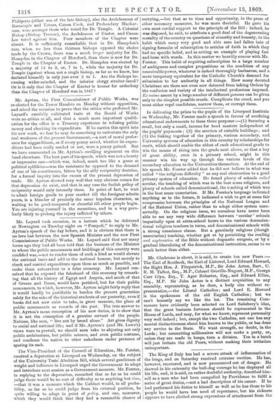The Vice-President of the Council of Education, Mr. Forster, received
a deputation at Liverpool on Wednesday, on the subject of the University Tests' Abolition Bill, which several gentlemen of weight and influence in Liverpool urged the Government to adopt and introduce next session as a Government measure. Mr. Forster, in replying to the deputation, remarked that as far as he could judge there would be no sort of difficulty as to anything but time, —that it was a measure which the Cabinet would, in all proba- bility, as far as he could judge from his external position, be quite willing to adopt in point of policy, and one, moreover, which they would think that they had a reasonable chance of 1 carrying,—but that as to time and opportunity, in the press of other necessary measures, he was more doubtful. He gave his own most cordial support to the principle of the Bill ; indeed, he was disposed, he said, to attribute a good deal of the degenerating morality of the country on questions of sincerity and honesty, to the habit which many very good and able men had fallen into of signing formulas of subscription to articles of faith in which they had no specific belief, and so setting an example of playing fast and loose with words. In this matter we heartily concur with Mr. Forster. This habit of requiring subscription to a large number of ambiguous and complex propositions as the condition of any conceivable power, whatever is indeed thoroughly barbarous, and a mere temporary equivalent for the Catholic Church's demand for submission to her authority in all things. How many devoted Christians are there not even now deterred from taking Orders by the confusion and variety of the intellectual professions imposed. Ex animo assent by a large number of different persons can be given only to the simplest possible creeds. Complicate the creed, and you must either repel candidates, narrow them, or corrupt them.


































 Previous page
Previous page